To explore the concept of bangs with a little more specificity, let’s break down some scenes from popular films. What we’re looking for here is a better understanding of why a particular scene has been chosen and how that particular scene begins.
The danger with this sort of analysis is that we’re looking at a linear medium. Unfortunately, one of the problems with analyzing the techniques of RPG play is that it’s difficult to establish common reference points: Whereas we can all pop in a Blu-Ray and watch the same movie, even groups running identical scenarios won’t necessarily have similar experiences.
For the purpose of this exercise, therefore, we’re going to pretend that these movies aren’t linear experiences. Even though, in reality, the outcome of each scene has already been predetermined we’re going to act as if that isn’t true. I’ll try to emphasize this by discussing the different outcomes a given scene might have.
Let’s start with The Avengers.
THE AVENGERS
At the beginning of the film, an evacuation has been ordered at the tesseract facility. The leads for the first several scenes are Nick Fury, Agent Coulson, and Agent Hill.
SCENE 1 – BANG: “Dr. Selvig read an energy surge from the tesseract. It’s a spontaneous event. We can’t shut it down.”
The agenda is: How is SHIELD going to react?
The agenda of this scene is interesting because of the way that it ties into the entire “Phase II vs. the Avengers Initiative” conflict that lies behind the entire film. It’s expressed most directly through the debate between Agent Hill and Director Fury, but we could also imagine a scenario where Fury reacts to the bang very differently: He chooses not to evacuate the facility because the work on the Phase II prototypes is too important to be disrupted (and the rest of the movie looks very different).
Most of this scene is color.
SCENE 2 – BANG: “There’s a huge burst of energy from the tesseract! Loki appears, wielding some sort of high-tech, spear-like weapon. It looks a lot like a Phase II weapon.”
The agenda is: Can SHIELD stop Loki from stealing the tesseract?
There’s also an interesting secondary agenda: Can they evacuate the compound before it collapses?
Note that both agendas are simultaneously set up with the bang.
This scene is obviously all about conflict and it lasts from Loki’s appearance until he makes his final escape: Martial arts flurry in the lab. Converting the featured characters of Hawkeye and Selvig. Bluffing Agent Hill. Car chase. Helicopter chase. The whole thing.
Let’s take a moment to imagine the agenda questions being answered differently during the actual play of an RPG: Maybe Coulson deprioritizes the evacuation of the facility and with his assistance they’re able to get the tesseract to the helicopter before Loki can get it. As a result, they lose the Phase II weapons (and a lot of their researchers), which will probably have a negative impact on their long-term resources. On the other hand, they’re able to secure the tesseract onboard the helicarrier. (Which is, of course, where Loki will end up targeting it next.)
SCENE 3 – BANG: “Your ruse has worked perfectly: You’re tied to a chair and being ‘interrogated’ by a Russian general. He’s got a couple of thugs flanking him. And there’s a table full of gleaming torture instruments shoved off to one side. You hear a large freight train go rumbling by outside.”
The agenda is: Can Natasha identify the other players in the general’s sale of illegal arms?
Natasha is the lead here, of course. The bang and agenda here are actually inconsequential (although if Natasha had followed up on this information she might have discovered that the thugs Loki was hiring came from this guy’s network). They’re really just providing contextualization for the next bang: “Agent Coulson calls. Barton’s been compromised.” That’s what the scene is really about: Is Natasha going to prioritize her personal commitment to Barton or the time she’s sunk into her current investigation?
Interesting note here. Whedon actually closes the scene with what could be interpreted as another bang: “Oh no. I’ve got Stark. You’ve got the big guy.” This prompts a scene which is actually not found in the movie (during which Natasha plans her operation to recruit Banner), but it’s an example of how effective it can be to deliver a bang and then immediately cut away from it. You’ll leave your players in anticipation of what the resolution of that bang will be.
SCENE 4 – BANG: “As you enter the house, you see the little girl hop out a window on the far side. The whole place looks abandoned.”
The agenda is: Is the Big Guy gonna show up?
The leads here are Banner and Natasha.
Note that you could also express this as, “Will Natasha successfully recruit Banner?” And while there is an element of that in the scene, it’s clearly a less interesting agenda and Whedon knows that. Which is why the question of Banner’s anger is introduced in the second line of the scene, the question of Banner being recruited doesn’t show up for another two minutes, and the scene ends when it’s clear Banner is able to keep it under control.
The important lesson to take away here, I think, is that the agenda of the scene is not always what the characters are talking about on the surface.
We’re also seeing how often Whedon employs escalating bangs throughout his scenes: There’s a girl asking you for help. The girl disappears. A beautiful superspy seems to materialize from behind a wall.
SCENE 5 – BANG: “The Council is demanding to know why you’re trying to reactivate the Avengers Initiative.”
The agenda is: Can Nick Fury convince the Council to activate the Avengers assets as a response team?
Mostly self-explanatory. Note that the conflict in this scene isn’t actually resolved. It is, at best, postponed. Remember that the big agendas will probably only be resolved over the course of multiple scenes.
On a personal note, I found this scene interesting because my initial impulse was to describe the bang as, “Sir. The Council is calling.” This bang is actually used later in the film and it works there because the circumstances of the call make it a big deal. Here, though, Whedon’s instinct is right: He cuts straight to the call.
And that would probably be the right call at the table, too: There’s really no reason to think that Nick Fury isn’t going to take a call from the Council at this point; ergo the decision to “pick up the phone” is not a meaningful choice and a harder frame is almost certainly the stronger, better choice.
Go to : The Art of Pacing – Film Banging: Alien

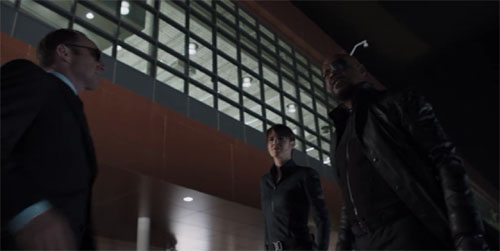
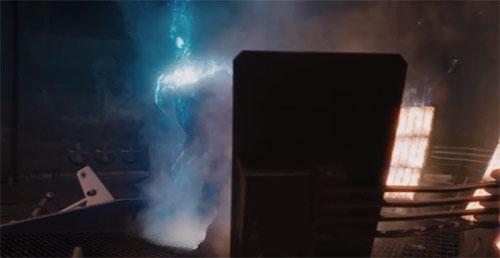
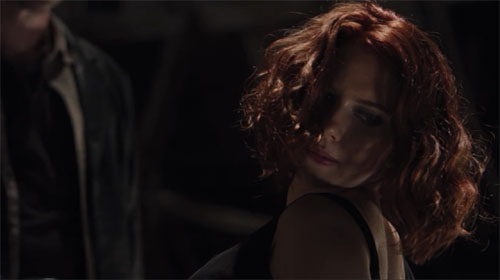
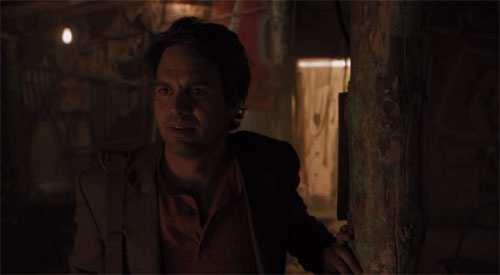
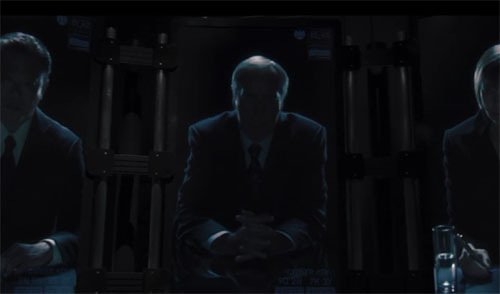











It’s really interesting (and useful) to see the scenes being dissected for bangs like this. I look forward to the Alien post.
@Justin,
Banging is a great concept! Forcing the players to react! It’s done in military training exercises etc, make the person react! Only in D&D for some reason, the typical opening is, we sit in the tavern, hear some rumors, buy equipment, and then go loot some pile of treasure also known as a local dungeon at our leisure.
There is a how to adventure design book that takes the theater stage approach to encounter design that you might find interesting, if not useful, it is called Hamlet’s Hit Points, by Robin D. Laws.
I think that skipping over “empty time”, can potentially lead to railroading and is potentially antithetical to the concept of sandbox adventuring.
Re: Empty time and sandbox gaming. It’s not really antithetical. It’s just a question of what your threshold for “meaningful decision” is.
For example, the average person goes to the bathroom 3-5 times per day. Let’s imagine we’ve got five PCs and a campaign that lasts for a month of in-setting time. If we never, ever skipped empty time then this game must include 600 separate visits to the bathroom being explicitly included. I’m willing to bet that your campaign doesn’t feature hundreds of bathroom breaks; and I’m also willing to bet that your players never felt railroaded as a result.
The idea that you can only have a “sandbox” by dwelling on every single moment of your character’s lives just in case something interesting *might* happen is not only a false ideal, it’s an undesirable one.
Justin, I agree, it is a question of the threshold for what constitutes a meaningful moment. Getting nitty-gritty down to the bathroom breaks is one extreme, however, scripting an adventure on terms of decision points and event nodes, and then moving players between one opportunity for a meaningful decision to another meaningful encounter, would be a move away from an open ended adventure. Let me give you an example. Players made their decisions, selected the party members and decided to go by boat. A week later they land at their destination, and they have to traverse the Barony to get to the place they are going to. More decisions. No meaningful decisions are made on the boat, bit those seven days give the players a chance to get to know one another’s character and the NPC’s. A day long ride across the Barony, possibility for random events and encounters, but nothing happens, except local color, Players arrive, get settled in, three days pass before the raid. Players go out on the town, visit the fair sampling 3 or 4 of 35 or so encounters in the guise of fair tents, Again, more exposition, more local color that might offer clues and hints of the world and what awaits, but nothing happens on the adventure scale until the raid on the fourth night. Could things have happened? Players could have had combat encounters, one player character acting suspiciously may have been caught as a spy. These random and incidental events could have gotten player characters killed or altered the course of the story, but they didn’t, and the town got raided on the fourth night.
Had I cut out the boat journey, the cross county ride, and the three nights on the town, I could have had condensed three or four gaming sessions into one, and most DM’s would have, but I would have the lost the sense of place and the exposure of the players to the game world. This approach would have not worked with telling a story via cinema, and it probably would have made for a poor reading, unless heavily edited, but role playing is a different medium, once defined by sociologists as “consensus reality building”, and it makes different demands on time, and a different approach must be taken when setting the threshold for empty time – For me empty time is sleeping, doing chores, and character routines, whatever they spend most time doing. Time has a way of speeding up, when players characters are in camp going about their business.
@ Broozer Bear,
You have some interesting arguments, but maybe a middle position could be employed to knock down those 4 game sessions to 1 more interesting one.
A simple idea, that might be worth considering. Since most of the travelogue you mentioned has only a moderate amount of chance to generate important adventure, instead of skipping over from traveling point A to a week later at destination by ship at point R, why not mention the not overly important intermediate steps in a short monologue of sights, smells, sounds, and personalities that were encountered in passing on the journey? You still get background flavor of the trip from A to R, without taking up multiple entire sessions to do so. If you and your players enjoy it, then obviously it’s its own reward and that’s the end of it. On the other hand, if the players (and the GM!) would have more fun with scenery with more action and intense ‘coloring,’ then you get both with this suggestion.
Neal,
No arguing with the middle ground, but who says those sessions were slow?
Role playing is a process, and when you make something part of the discussion, people internalize and memorize it better. Remember, that for players to take adequate initiative (develop player agency, I think it’s called), they have to be tuned into the detail of your setting, especially of they will have the initiative and not require bread crumbs or signposts from the DM.
The way those slow sessions looked, was back and forth storytelling and discussion via role-playing with the NPC’s. This does not move the story forward, but creates an immersive effect, and WHO SAID THAT THESE SESSIONS WERENT FUN? The second thief, an NPC was running late, and barely made it. Ran up the gangplank and ran inside the hold to hide. While players scratched their head, one has the wherewithal to urge the Captain to shove off. Ship sailed just as men at arms appeared on the docks. Among the NPC’s was a shaman, a ranger payer’s nature guide. He and the ranger did Ahuayasca, a South American version of the Peyote ceremony. The magic user did it, and rolled a success, I gave him an LSD-like scene of the shaman picking him up, and kicking him like a football into the orbit. Magic User flew around the game world and I took him a trippy kaleidoscope of what he witnessed flying around the world. He then went back to the group and tried to explain what he saw and the players tried to figure out what it is that he saw. On the heels of the Magic User, the Cleric, a very organized and a natural caller, tried the same hit, and wanted to se angels and talk to God. In my game, clerical spells are cast via “Priest’s prayer ability”. You roll, you succeed or you fail, perform miracles or fumble. In case of the Cleric, he rolled “00” on percentile dice (critical failure) followed by another “00”!. I had to think what this meant, but in the meantime, not only didn’t Cleric see any Angels, he lost all his Clerical powers. I had to do some intense Christian theological research after the session, to see why the Cleric might have suffered the loss of his power connected to partaking in that Peyote ritual. I worked out the rationale and it took the player almost a third of the campaign to make sense of that happened and undo the damage to his character. Finally, the bad boy Fighter shacked up with a female NPC witch (an older, but brilliant first level magic user, who cast a charm person on him and had a high CHA to boot. I did this, because the player told me he hated older women, and he was playing a young, dumb, aggressive fighter and a second in command, who didn’t have the balls to play a thief and risk becoming an Outlaw. The Captain gave the lady his cabin for privacy o the river boat, and the two were doing the dirty in his bed, when the Captain walked in on them, escorting a Customs official who was supposed to collect the merchandise tax. That was some fire that the players had to put out. Not so much with the official, an NPC wizard, who upbraided the fighter, but then couldn’t keep a straight face and burst out laughing, but with the Captain, who was so angry and embarrassed, that he wanted to off-load players right there and then on an empty lake shore. Players were sweating and tap-dancing.
Those were good game sessions, methinks superior to the mega-dungeon crawl that followed.
Think of it as a question with three possible answers. The question: “Is anything interesting going to happen?” The possible answers:
(a) Yes, don’t skip it
(b) No, skip it
(c) I’m not sure, check with the players
So if we take your boat trip, for example, there’s all kinds of interesting things that are happening on the boat. So the answer is obviously, “Yes, don’t skip it.” Why? Because when interesting stuff is happening then that isn’t empty time.
But let’s imagine that it’s a different boat trip. The PCs already know each other, there’s nothing particularly notable about the crew, and your gut instinct as GM says that the only thing that’s going to happen for the next seven days is idle chit-chat and maybe some inconsequential games of dragonscales. It’s a good chunk of time, though, so let’s double check:
GM: “It’ll take about seven days to sail up the river. Anybody planning something in particular for those seven days?”
Players: “Nope.” “Probably not.” “Working on my tan.”
GM: “Sounds good. The smell of fish is heavy in the air as you step off the dock in Ravensburg. The skyline is cloaked in a thick smog of black smoke that’s pouring out of countless factories. Stella, give me a Perception check.”
I agree with you, there is both, empty time and dead space, stuff that we can safely skip over, and it depends on the individual taste what can be skipped over. With me, it is the sleeping time and the routine camp chores that constitute time worth skipping over.
With regards to things notable and not, let’s consider riding a bus. You watch girls? We all do. We can make an argument as to how not noticeable a regular bus ride can be. I always look out the windows, planes, trains and automobiles, and often take scenic routes, and I always find something interesting worth seeing. This might be a personal preference of mine, but consider a routine bus ride in your home town, versus a routine bus in Iraq or Nepal. Still not worth keeping your eyes open on a bus ride overseas? And if you are a DM laying out adventure for your players, shouldn’t you be giving them Iraq bus rides as opposed to ones in your home town?
However, even when you have spots of dead space and empty time, casually covering days and weeks in your narration (such as when the players are studying for advancing in level and living between the adventures, you can always expand your focus and introduce exposition and story elements seeds of future adventuring into your narrative. Remember, that a DM/GM is, first and foremost, a good story-teller.
[…] “Bang”, a dramatic moment that keeps the plot moving story and/or forces a decision. In Film Banging: Agendas and Bangs from Non-RPG Media, he uses scenes from the Avengers movie to illustrate both the Bang, and the Agenda, the question […]